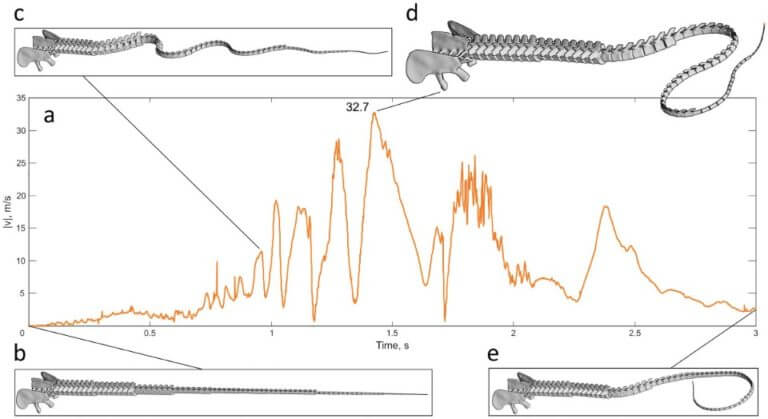
Scientists Find Out If A Lashing Dinosaur Tail Could Generate A Sonic Boom
Because why not?
By Clare Watson | Science Alert
Every once in a while, scientists embark on a study to test some weird and wacky hypothesis that makes you wonder why. But let’s indulge them; it can be fun.
A new study from a team of palaeontologists and aerospace engineers has simulated a dinosaur‘s tail as it lashes about, all to see whether long-necked sauropods could whip their appendages faster than the speed of sound – quick enough to produce the crack of a small, supersonic boom.
Previous research has suggested the dinos could, if their tails had a bullwhip-like structure adding length. If that were true, these herbivorous dinosaurs might have used their tails to defend themselves against predators or nosy neighbours.
But other palaeontologists weren’t so sure.
Many theories have been bandied about as to why diplodocid dinosaurs, a group of sauropods that includes Brontosaurus, have such long, slender tails.
They could be a defensive weapon, sure. But diplodocids might have used their tails to make noise, to counterbalance their long necks, to prod the ground around them, or as a ‘third leg’ to stabilize them like a rearing kangaroo.
Among the diplodocid family are some of the longest creatures to have ever walked the Earth, so it’s little wonder their body forms are a curiosity, for engineers and palaeontologists alike.
No complete diplodocid tail has been found so far, so the researchers behind this latest study, led by palaeontologist Simone Conti from NOVA University near Lisbon, Portugal, pieced together what was known from five fossilized diplodocid dinosaurs.
To their models, they added material properties of soft tissues such as skin, tendons, and ligaments – in addition to modelling the 80 or so vertebrae (bones) diplodocids have in their tails alone. Humans, for comparison, have just 33 from top to tailbone.
The internal soft tissue morphology of sauropod tails is still a big unknown since only skin impressions and bones are preserved in the fossil record.
So Conti and colleagues inferred the tail’s soft tissue makeup based on bone structure. They also estimated skin thickness based on crocodile skin, modelling the mechanical strain that these soft tissues could withstand as the tail whipped back and forth.
In the computer models, the hefty appendage attached to an unmovable hip bone base weighed in at 1,446 kilograms (3,187 pounds) and measured 12 meters (40 feet) long.
It sounds strong – but only to a point. Skin is a complex organ threaded with collagen fibres that give it elasticity, but it becomes “almost completely brittle” when put under high strain, Conti and colleagues explain in their paper.
Simulating the mechanical properties of soft tissues and the rotational movement of the tail, they found diplodocid tails were “stiffer than previously thought, with an important role played by the tendons and musculature to avoid disarticulation of the vertebrae once the tail is set in motion.”
But the simulated tail didn’t break the sound barrier due to friction of the tail muscles and vertebrae, and aerodynamic drag. And if it had, it would have snapped.
At its tip, the tail moved at speeds of around 30 meters per second or 100 kilometres per hour, 10 times slower than the speed of sound (340 meters per second) and not fast enough to create a supersonic boom.
A thin, whip-like tail couldn’t withstand the stress of moving at the speed of sound without the tail breaking, regardless of whether it consisted of braided keratin filaments, like other dinosaur taxa, three segments made of skin and keratin, or a fleshy flail-like mass.
“Even if the hip would greatly increase the movement of the tail, our estimate of soft tissue resistance would not support the supersonic movement of dinosaur tails,” Conti and colleagues write.

As the researchers point out, however, that doesn’t rule out the possibility that diplodocids might have used their tails to land defensive blows or engage in intraspecies combat.
Conti and co. calculated the force of impact of the tail tip traveling at speeds of around 30 meters per second and found it would be equivalent to the pressure applied by a golf ball traveling at 315 kilometres (196 miles) per hour.
Supersonic boom or not, that’s got to hurt.
“Such pressure would not be able to break bones or lacerate skins but would deliver a sensible blow,” Conti and colleagues write.
The research was published in Scientific Reports.
* * *
What If Dinosaurs Never Went Extinct?
READ MORE: A Dinosaur Killed On The Day of The Fatal Asteroid May Have Been Discovered
Read more on Amazing Dinosaur Facts: Giant ‘Death Shadow’ Dinosaur Found In Argentina Is Largest Megaraptor On Record
Liked it? Take a second to support Collective Spark.
We’d love to hear from you! If you have a comment about this article or if you have a tip for a future Collective Spark Story please let us know below in the comment section.
